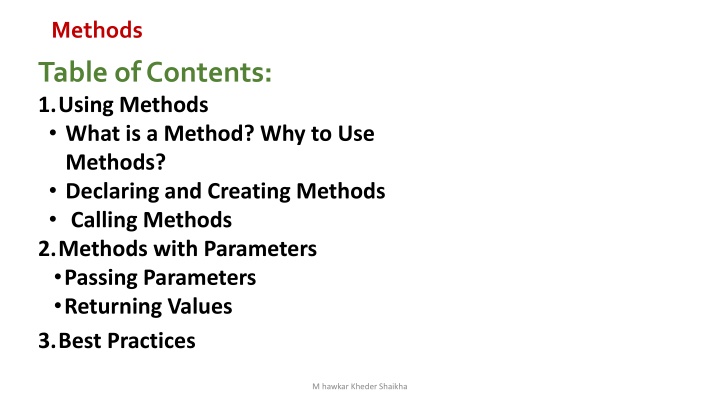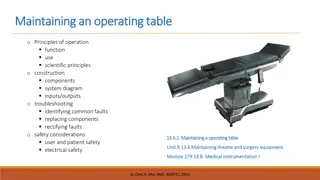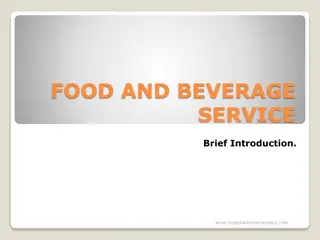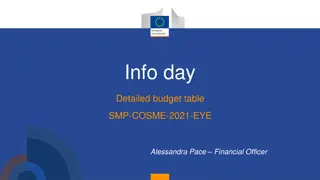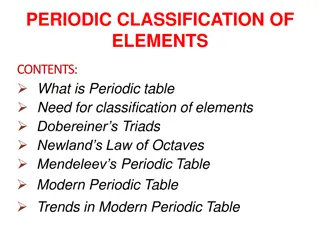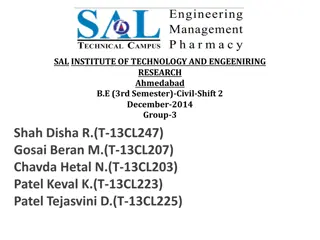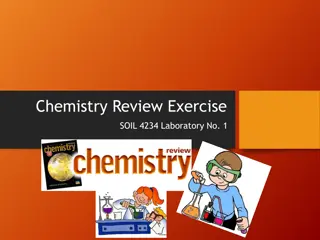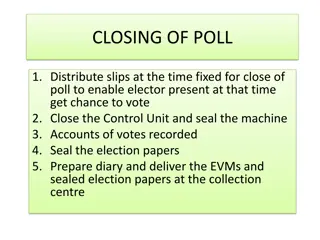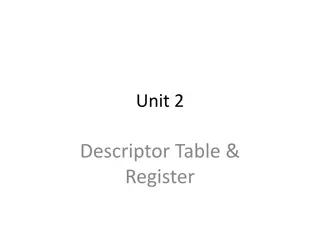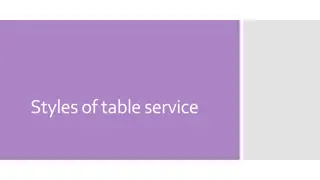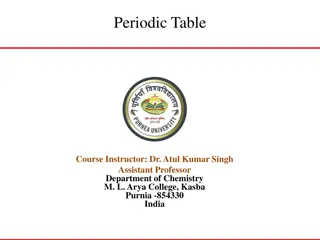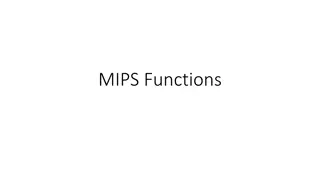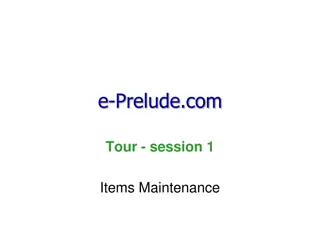Methods Table of Contents: Using Methods - What, Why, Declaring, Creating, Calling, Parameters
In this content, you'll discover the essence of methods in programming, their significance, and how they are declared, created, and utilized with and without parameters. Learn the art of passing parameters and returning values effectively through practical examples and clear explanations.
Download Presentation

Please find below an Image/Link to download the presentation.
The content on the website is provided AS IS for your information and personal use only. It may not be sold, licensed, or shared on other websites without obtaining consent from the author.If you encounter any issues during the download, it is possible that the publisher has removed the file from their server.
You are allowed to download the files provided on this website for personal or commercial use, subject to the condition that they are used lawfully. All files are the property of their respective owners.
The content on the website is provided AS IS for your information and personal use only. It may not be sold, licensed, or shared on other websites without obtaining consent from the author.
E N D
Presentation Transcript
Methods Table of Contents: 1.Using Methods What is a Method? Why to Use Methods? Declaring and Creating Methods Calling Methods 2.Methods with Parameters Passing Parameters Returning Values 3.Best Practices M hawkar Kheder Shaikha
What is a Method? A method is a kind of building block that solves a small problem A piece of code that has a name and can be called from the other code Can take parameters and return a value Methods allow programmers to construct large programs from simple pieces Methods are also known as functions, procedures, and subroutines M hawkar Kheder Shaikha
Why to Use Methods? More manageable programming Split large problems into small pieces Better organization of the program Improve code readability Improve code understandability Avoiding repeating code Improve code maintainability Code reusability Using existing methods several times M hawkar Kheder Shaikha
Declaring and Creating Methods Method name static void PrintText() { Console.WriteLine( Any text here"); } Each method has a name It is used to call the method Describes its purpose M hawkar Kheder Shaikha
Declaring , Creating and Calling Methods Each method has a body It contains the programming code Surrounded by { and } Methods are always declared inside a class Main() is also a method like all others To call a method, simply use: 1. The method s name 2. Parentheses (don t forget them!) 3. A semicolon (;) M hawkar Kheder Shaikha
class Program { static void Main(string[] args) { Calling Method PrintText(); Console.ReadKey(); } Name of Method static void PrintText() { } } Body of Method Console.WriteLine("Any text here"); M hawkar Kheder Shaikha
Method Parameters To pass information to a method, you can use parameters (also known as arguments) You can pass zero or several input values You can pass values of different types Each parameter has name and type Parameters are assigned to particular values when the method is called Parameters can change the method behavior depending on the passed values M hawkar Kheder Shaikha
static void Main(string[] args) { Passing Parameters PrintSign(2); Console.ReadKey(); } static void PrintSign(int number) { if (number > 0) Console.WriteLine("Positive"); else if (number < 0) Console.WriteLine("Negative"); else Console.WriteLine("Zero"); } Method s behavior depends on its parameters Parameters can be of any type int, double, string, etc. arrays (int[], double[], etc.) M hawkar Kheder Shaikha
Methods can have as many parameters as needed: static void Main(string[] args) { PrintMax(2,3); Console.ReadKey(); } static void PrintMax(float number1, float number2) { float max = number1; if (number2 > number1) max = number2; Console.WriteLine("Maximal number: {0}", max); } The following syntax is not valid: static void PrintMax(float number1, number2) M hawkar Kheder Shaikha
Calling Methods with Parameters Use the method s name, followed by a list of expressions for each parameter Expressions must be of the same type as method s parameters (or compatible) If the method requires a float expression, you can pass int instead Use the same order like in method declaration For methods with no parameters do not forget the parentheses Examples: PrintSign(-5); PrintSign( balance ); PrintSign(2+3); PrintMax(100, 200); PrintMax(oldQuantity * 1.5, quantity * 2); M hawkar Kheder Shaikha
Months Example static void Main(string[] args) { SayMonth(2); Console.ReadKey(); } static void SayMonth(int month) { string[] monthNames = new string[] { "January", "February", "March", "April", "May", "June", "July", "August", "September", "October", "November", "December"}; Console.Write(monthNames[month - 1]); } M hawkar Kheder Shaikha
Printing Triangle Example static void Main() { int n = int.Parse(Console.ReadLine()); for (int line = 1; line <= n; line++) PrintLine(1, line); for (int line = n - 1; line >= 1; line--) PrintLine(1, line); Console.ReadKey(); } static void PrintLine(int start, int end) { for (int i = start; i <= end; i++) { Console.Write(" {0}", i); } Console.WriteLine(); } M hawkar Kheder Shaikha
Optional Parameters C# 4.0 supports optional parameters with default values: static void Main() { PrintNumbers(); Console.ReadKey(); } static void PrintNumbers(int start = 0, int end = 10) { for (int i = start; i <= end; i++) { Console.Write("{0} ", i); } } The above method can be called in several ways: PrintNumbers(5, 10); PrintNumbers(15); PrintNumbers(); PrintNumbers(end: 40, start: 35); M hawkar Kheder Shaikha
Returning Values From Methods A method can return a value to its caller Returned value: Can be assigned to a variable: string message = Console.ReadLine(); // Console.ReadLine() returns a string Can be used in expressions: float price = GetPrice() * quantity * 1.20; Can be passed to another method: int age = int.Parse(Console.ReadLine()); M hawkar Kheder Shaikha
Instead of void, specify the type of data to return static void Main() { Console.WriteLine(Multiply(2,3)); Console.ReadKey(); } static int Multiply(int firstNum, int secondNum) { return firstNum * secondNum; } Methods can return any type of data (int, string, array, etc.) void methods do not return anything The combination of method's name, parameters and return value is called method signature Use return keyword to return a result M hawkar Kheder Shaikha
The return Statement The return statement: Immediately terminates method s execution Returns specified expression to the caller Example: return -1; Temperature Conversion M hawkar Kheder Shaikha
Convert temperature from Fahrenheit to Celsius: static void Main() { Console.Write("Temperature in Fahrenheit: "); double t = Double.Parse(Console.ReadLine()); t = FahrenheitToCelsius(t); Console.Write("Temperature in Celsius: {0}", t); Console.ReadKey(); } static double FahrenheitToCelsius(double degrees) { double celsius = (degrees - 32) * 5 / 9; return celsius; } M hawkar Kheder Shaikha
Check if a number is positive: static void Main() { Console.Write(ArePositive(-2)); Console.ReadKey(); } static bool ArePositive(int Num) { bool Val; if (Num <= 0) Val = false; else Val = true; return Val; } M hawkar Kheder Shaikha
Validating input data: static void Main() { Console.WriteLine("What time is it?"); Console.Write("Hours: "); int hours = int.Parse(Console.ReadLine()); Console.Write("Minutes: "); int minutes = int.Parse(Console.ReadLine()); bool isValidTime = ValidateHours(hours) && ValidateMinutes(minutes); if (isValidTime) Console.WriteLine("It is {0}:{1}",hours, minutes); else Console.WriteLine("Incorrect time!"); Console.ReadKey(); } static bool ValidateMinutes(int minutes) { bool result = (minutes >= 0) && (minutes <= 59); return result; } static bool ValidateHours(int hours) { bool result = (hours >= 0) && (hours <= 23); return result; } M hawkar Kheder Shaikha
Methods Best Practices Each method should perform a single, well-defined task Method s name should describe that task in a clear and non-ambiguous way Good examples: CalculatePrice, ReadName Bad examples: f, g1, Process In C# methods should start with capital letter Avoid methods longer than one screen Split them to several shorter methods M hawkar Kheder Shaikha
Questions? 1. Write a method that asks the user for his name and prints Hello, <name> (for example, Hello, Peter! ). Write a program to test this method. 2. Write a method GetMax() with two parameters that returns the bigger of two integers. Write a program that reads 3 integers from the console and prints the biggest of them using the method GetMax(). 3. Write a method that returns the last digit of given integer as an English word. Examples: 512 "two", 1024 "four", 12309 "nine". 4. Write a method that counts how many times given number appears in given array. Write a test program to check if the method is working correctly. 5. Write a method that checks if the element at given position in given array of integers is bigger than its two neighbors (when such exist). 6. Write a method that returns the index of the first element in array that is bigger than its neighbors, or -1, if there s no such element. Use the method from the previous exercise. M hawkar Kheder Shaikha
